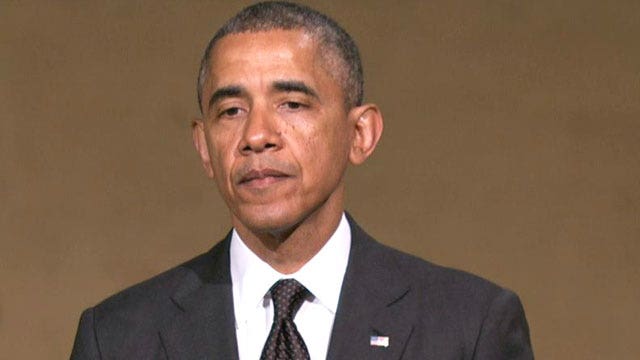President Obama addresses 9/11 museum dedication
President pays tribute to heroes, victims, survivors and families
NEW YORK – President Barack Obama and Sept. 11 survivors, rescuers and victims' relatives are expected to mark the opening of the 9/11 museum, where the story of the terrorist attacks is told on a scale as big as the twin towers' columns and as intimate as victims' last voicemails.
The National September 11 Memorial Museum is set to be dedicated Thursday before opening to the general public May 21.
By turns chilling and heartbreaking, the ground zero museum leads people on an unsettling journey through the terrorist attacks, with forays into their lead up and legacy.
There are scenes of horror, including videos of the skyscrapers collapsing and people falling from them. But there also are symbols of heroism, ranging from damaged fire trucks to the wristwatch of one of the airline passengers who confronted the hijackers.
"You won't walk out of this museum without a feeling that you understand humanity in a deeper way," museum President Joe Daniels said Wednesday.
The museum and memorial plaza above, which opened in 2011, were built for $700 million in donations and tax dollars. Work on the museum was marked by construction problems, financial squabbles and disputes over its content and the appropriate way to honor the dead, but its leaders see it as a monument to unity and resilience.
And its opening is prompting reflection from presidents and the everyday people whose lives were changed by the attacks.
Obama is mindful of "the need to remember and the power of memory in a nation's history, as well as the need to properly grieve and rebuild," White House spokesman Jay Carney said Wednesday. Former President George W. Bush issued a statement saying the museum "will help ensure that our nation remembers the lessons of Sept. 11."
Charles G. Wolf, who lost his wife, Katherine, awaited Thursday's ceremonial opening with a mix of anticipation and dread.
"It brings everything up," he said Wednesday.
Visitors start in an airy pavilion where the rusted tops of two of the World Trade Center's trident-shaped columns shoot upward. From there, museumgoers descend stairs and ramps, passing through a dark corridor filled with the voices of people remembering the day and past the battered "survivors' staircase" that hundreds used to escape the burning towers.
At the base level — 70 feet below ground, amid remnants of the skyscrapers' foundations — there are such artifacts as a mangled piece of the antenna from atop the trade center and a fire truck with its cab shorn off.
Then, galleries plunge visitors into the chaos of Sept. 11: fragments of planes, a set of keys to the trade center, a teddy bear left at the impromptu memorials that arose after the attacks, the dust-covered shoes of those who fled the skyscrapers' collapse, emergency radio transmissions and office workers calling loved ones, even a recording of an astronaut solemnly describing the smoke plume from the International Space Station.
Sprinkled in are snippets about the 19 hijackers, including photos of them on an inconspicuous panel.










































